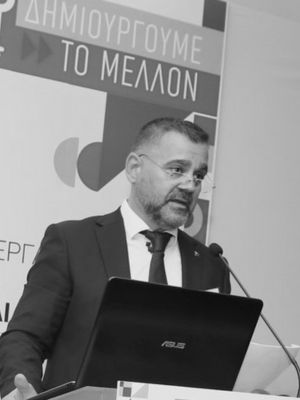Engineering Management
(MSc, 1.5 Years or 3 Semesters)
Duration
1.5 years
Qualification Awarded
Master of Science in Engineering Management
Level of Qualification
Master Degree (2nd Cycle)
Language of Instruction
English
Mode of Study
Full-time or Part-time
Minimum ECTs Credits
90
No enrolments for current semester
Request Information
Engineering Management (MSc, 1.5 Years or 3 Semesters)
| Duration | 1.5 years |
| Qualification Awarded | Master of Science in Engineering Management |
| Level of Qualification | Master Degree (2nd Cycle) |
| Language of Instruction | English |
| Mode of Study | Full-time or Part-time |
| Minimum ECTS Credits | 90 |
No enrolments for current semester
Request Information
Profile of the Programme
Continuous technological, economic and social challenges influence businesses to seek innovative Engineer-Managers; not only to design engineered systems but also to: handle projects/design and development; create strategic plans; handle financing; interface with marketing; recognise and evaluate market opportunities.
An Engineering Management graduate programme has a three dimensional focus: technical people, projects and organisations. It prepares engineers and science graduates to become future industry leaders by building a solid business foundation. It focuses on various management topics, mainly on innovation and technology management in specific engineering disciplines and develops graduates’ leadership, negotiation, and communication skills.
The M.Sc. Engineering Management is an interdisciplinary Master of Science programme, running under the Department of Management & MIS. It is designed for experienced professionals with a Bachelor’s in Engineering, Science or related scientific areas. Programme graduates will learn to: coordinate and lead engineering projects; manage engineering teams, engineering functions and organisations; handle Accounting, Finance and Engineering Economics; participate in decision making processes; and develop and implement engineering projects and solutions.
Whilst building their project management skills through the Project Management course ENMA-500 based on the Project Management Institute’s (PMI) standards, students will be prepared to undertake the Project Management Professional (PMP) Examinations.
Career Prospects
- For Engineers currently employed in the private, public and semi-public sectors
- Technical entrepreneurs
- Managers of engineering and technology organisations
- Business consultants
- Human resource managers
- Product development designers
Access to Further Studies
Graduates of the programme can be accepted into Third Cycle degrees (Doctorate Degree)
Course assessment usually comprises of a comprehensive final exam and continuous assessment. Continuous assessment can include amongst others, mid-terms, projects, and class participation.
Letter grades are calculated based on the weight of the final exam and the continuous assessment and the actual numerical marks obtained in these two assessment components. Based on the course grades the student’s semester grade point average (GPA) and cumulative point average (CPA) are calculated.
The student must complete 90 ECTS and all programme requirements.
A minimum cumulative grade point average (CPA) of 2.0 is required. Thus, although a ‘D-‘ is a PASS grade, in order to achieve a CPA of 2.0 an average grade of ‘C’ is required.
Upon successful completion of this program, graduates should be able to:
- Apply the knowledge and principles of management, leadership and negotiation concepts in managing teams of people;
- Understand and apply principles, concepts and strategies to assess the industry dynamics of technological innovation for developing and deploying new products and services;
- Identify, formulate and solve complex engineering management problems;
- Apply an integrative and interdisciplinary way of thinking and a combination of skills and qualifications which include critical/analytical thinking, technical knowledge, and problem solving of engineering management problems;
- Develop solutions that meet the desired needs within the economic, engineering, technology and sustainability borders;
- Function and communicate effectively in multi-disciplinary teams;
- Understand and be able to design operation systems for enhancing the strategic role of operations management in organisations, and gain a competitive advantage in the marketplace;
- Develop a clear understanding of the concepts, rules and principles of the major types of intellectual property, contracts, company establishment, economic losses and remedies.
| Course Code | Course Title | ECTS Credits |
|---|---|---|
| ENMA-500 | Project Management | 7.5 |
| ENMA-505 | Operations and Quality Management | 7.5 |
| ENMA-510 | Organisations and Human Resource Management | 7.5 |
| ENMA-515 | Strategic Management of Innovation and Technology | 7.5 |
| ENMA-520 | Leadership and Negotiation Techniques | 7.5 |
| ENMA-525 | Statistical Methods in Engineering | 7.5 |
| ENMA-530 | Managing Engineering Teams | 7.5 |
| ENMA-535 | Finance for High-Tech Industries | 7.5 |
| ENMA-540 | Safety and Risk Management | 7.5 |
| ENMA-545 | Strategic Marketing | 7.5 |
| ENMA-550 | Product Development Process | 7.5 |
| ENMA-555 | Legal Aspects in Engineering | 7.5 |
| ENMA-560 | Graduate Seminars | 0 |
Semester 1
| Course ID | Course Title | ECTS Credits |
|---|---|---|
| ENMA-500 | Project Management | 7.5 |
| ENMA-505 | Operations and Quality Management | 7.5 |
| ENMA-510 | Organisations and Human Resource Management | 7.5 |
| ENMA-515 | Strategic Management of Innovation and Technology | 7.5 |
Semester 2
| Course ID | Course Title | ECTS Credits |
|---|---|---|
| ENMA-520 | Leadership and Negotiation Techniques | 7.5 |
| ENMA-525 | Statistical Methods in Engineering | 7.5 |
| ENMA-530 | Managing Engineering Teams | 7.5 |
| ENMA-535 | Finance for High-Tech Industries | 7.5 |
Semester 3
| Course ID | Course Title | ECTS Credits |
|---|---|---|
| ENMA-540 | Safety and Risk Management | 7.5 |
| ENMA-545 | Strategic Marketing | 7.5 |
| ENMA-550 | Product Development Process | 7.5 |
| ENMA-555 | Legal Aspects in Engineering | 7.5 |
The above semester breakdown is an indicative one. A few of the courses are electives and can be substituted by others. Students may contact their academic advisor and consult their academic pathway found on this website under “Schools & Programmes”.











